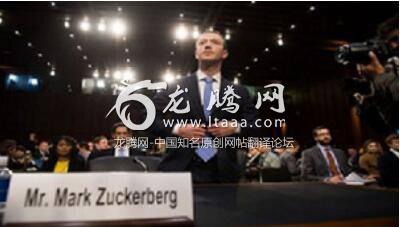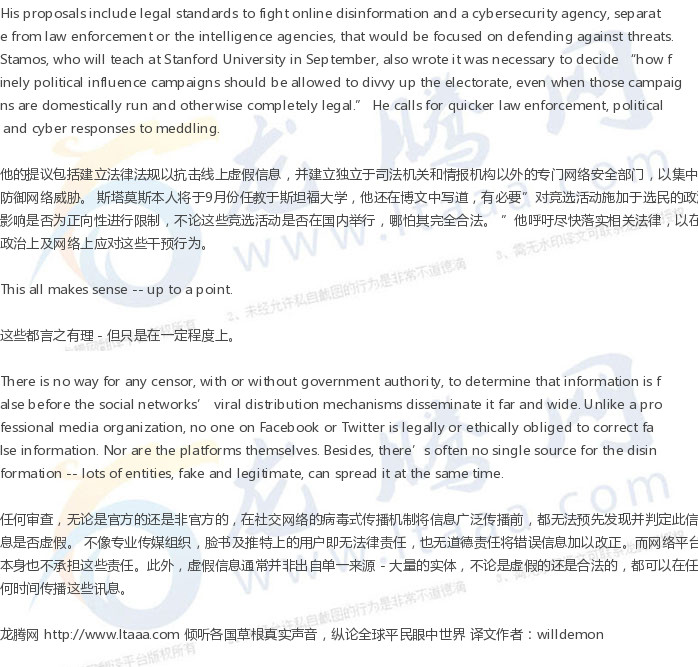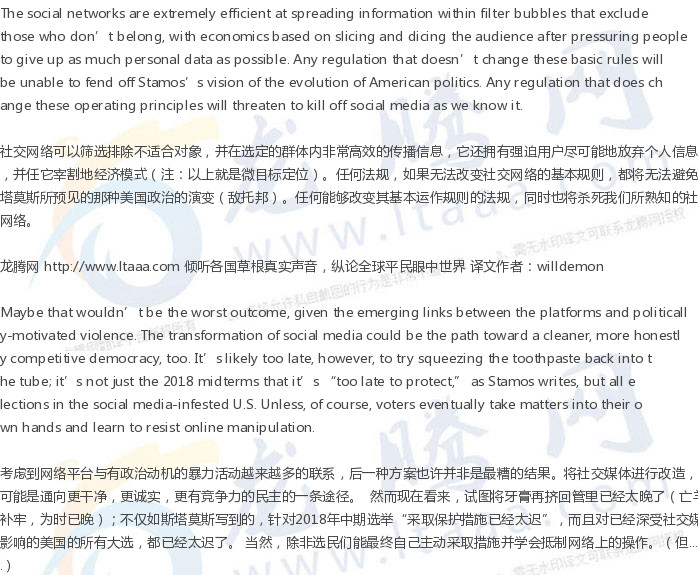脸书正使美国成为政治上的敌托邦 [美国媒体]
美国的选举恐怕正在转变为“信息战世界杯,而美国的对手们和盟友们则在其中相互斗争以将事关他们各自利益的信息灌输给美国选民”这一强有力的描述来自于一位颇有远见的消息提供人:脸书的前首席安全官亚历克斯.斯塔莫斯,他已于本月离开脸书。
Facebook Is Making the U.S. a Political Dystopia
脸书正使美国成为政治上的敌托邦
(敌托邦:乌托邦的反义词,指不理想,噩梦般的国度)
The company’s former chief security officer warns that elections are turning into the “World Cup” of misinformation and manipulation.
这家公司的前任首席安全官警告称选举正在转变为充斥虚假信息和人为操纵的“世界杯”。
By Leonid Bershidsky
撰文:雷昂尼德.博辛斯基
August 24, 2018, 6:30 AM EDT
2018年8月24日
He may not have the answer. Photographer: Saul LOEB/AFP/Getty Images)
他(马克.扎克伯格)可能没有解决方案。摄影师:索尔.罗伯/法新社/盖蒂图片社)
U.S. elections are threatening to become the “World Cup of information warfare, in which U.S. adversaries and allies battle to impose their various interests on the American electorate.” That powerful statement comes from a knowledgeable source: Facebook’s former Chief Security Officer Alex Stamos, who left the company this month.
美国的选举恐怕正在转变为“信息战世界杯,而美国的对手们和盟友们则在其中相互斗争以将事关他们各自利益的信息灌输给美国选民”这一强有力的描述来自于一位颇有远见的消息提供人:脸书的前首席安全官亚历克斯.斯塔莫斯,他已于本月离开脸书。
Stamos suggested ways to avoid this dystopian future in a post for the blog Lawfare. He confessed that his “personal responsibility for the failures of 2016 continues to weigh” on him. But he hasn’t been able to strike enough distance from Facebook to admit that it’s the social networks’ key features, not their security bugs, that are responsible for making U.S. democracy and its marketplace of ideas vulnerable to dishonest, unscrupulous actors, both foreign and domestic.
在“法律战”博客的一篇贴文中,斯塔莫斯给出了避免这种敌托邦式未来的几种方案。 他坦白称此举是出于“其本人为了2016年的失败(指俄操纵美选举)而要继续负担的责任”。但是由于他尚不能完全与脸书断绝关系,因此未能承认:正是社交网络的主要特性,而非脸书的安全漏洞,造成了美国民主及观念市场易于受到国内国外那些虚假的,无耻的活动份子的侵害。
The advent of the social networks has made media a free-for-all. If anyone, named or anonymous, foreign of domestic, paid or not, sane or crazy, honest or crooked can be a news source with an unlimited distribution potential, there’s no way to rein in disinformation. In this kind of marketplace, anything goes because everyone competes for attention on the same terms. That’s the great democratic appeal of social media.
社交网络的诞生使得媒体能够对社会全员开放。任何一个个体,不论是实名还是匿名,不论在国外还是国内,不论是被收买还是自发,不论精神正常还是不正常,不论是老实人还是骗子,都可以成为一个拥有无限传发潜能的讯息源,没有任何方法可以控制虚假信息。 在当前市场条件下,人们为了在同等情况下吸引眼球,任何事情都可能做得出来。这恰是人们对社会媒体的巨大民主诉求。
It’s also what powers Stamos’s bleak vision of an infowar World Cup, in which U.S. adversaries such as Iran, China and North Korea, domestic influence groups, along with U.S. allies seeking to promote candidates, can use the same tricks as the Russians, whose social network campaign in the 2016 presidential election “required only basic proficiency in English, knowledge of the U.S. political scene available to any consumer of partisan blogs, and the tenacity to exploit the social media platforms’ complicated content policies and natural desire to not censor political speech.”
但是这一点同样也强化了斯塔莫斯所指出的信息战世界杯的黯淡前景。在信息战中,美国的对手如伊朗、中国及朝鲜,还有国内各势力,以及美国的盟友们都在寻求手段以支持其倾向的候选人,都可以学习利用俄国人的伎俩,后者在2016年(美国)总统大选中操作社交网络活动,利用了“仅有基本的英语能力,了解美国,理解各政党博客用户的政治立场,善于利用网络媒体平台内容复杂的特征,并对政治言论审查天然抵触”的人。
Stamos clearly is uneasy about the microtargeting of political messages to specific voters. But microtargeting is the core of the social media platforms’ business models. If it’s legitimate for selling goods, why shouldn’t it be used to spread ideas? If direct political messaging were regulated but microtargeting wasn’t, political actors would find other ways to propagate their message: books, media articles or charitable causes. That kind of regulation probably won’t be a deterrent. When Russia banned alcohol advertising on television, companies started taking out ads for mineral water with the same labels as their vodka.
很明显,斯塔莫斯对将政治信息传给特定选民的“微目标定位”感到担忧。但是,”微目标定位”恰是网络媒体平台营销模式的核心。如果它可以被用来合法销售产品,没什么不能同样用它来传播观念呢? 如果直接传播政治信息是合规的,但是不允许使用微目标定位,那么政治活动分子还会寻找其他方式来传播其政治信息:如书籍,媒体文章或是慈善活动。所以那样的法规无法真正起到震慑作用。当俄国政府禁止在电视上播放酒类广告后,那些酿酒企业便取而代之推出了与他们的伏特加同样品牌的矿物质水的广告。
This column does not necessarily reflect the opinion of the editorial board or Bloomberg LP and its owners.
此文章内容并不代表本编辑社或彭博社及其所有者的观点。
Antonio García Martínez
@antoniogm
Aug 25 8月25日
Replying to @sivavaidand @bopinion
They were of course a cornucopia of frank and well-meaning truth-telling before Facebook showed up.
在脸书未推出之前,他们无疑还是一群诚实的,善意的,讲真话的人。
Pierre Asselin
@PierAsselin
Aug 25 8月25日
Of course, but the delivery system is the issue here.
当然,但是传播信息的系统现在有问题。
Antonio García Martínez
@antoniogm
Aug 25 8月25日
I think it's more about who controls the delivery system these days, vs. who it was in elections past.
过去是谁在竞选更重要,现在则是谁掌控了信息传播系统更重要
Pierre Asselin
@PierAsselin
Aug 25 8月25日
True.
没错。
John Stoehr
@johnastoehr
·
Aug 24 8月24日
Replying to @sivavaid and @bopinion
Amen.
阿门。
US Economy Steamroll
@Shlik__
Aug 25 8月25日
Replying to @TheOneDave
It's advertising. There's advertising on TV. Why is Facebook different? It's not but it gives liberals an excuse because they are scared that they actually might truly live in an echo chamber
这篇文章就是在宣传。电视上也有宣传。脸书有什么不同? 这篇文章的观点不过是给了自由主义者一个借口,因为害怕,害怕他们可能实际上住在一个回声室里的事实。
版权声明
我们致力于传递世界各地老百姓最真实、最直接、最详尽的对中国的看法
【版权与免责声明】如发现内容存在版权问题,烦请提供相关信息发邮件,
我们将及时沟通与处理。本站内容除非来源注明五毛网,否则均为网友转载,涉及言论、版权与本站无关。
本文仅代表作者观点,不代表本站立场。
本文来自网络,如有侵权及时联系本网站。
图文文章RECOMMEND
热门文章HOT NEWS
-
1
Why do most people who have a positive view of China have been to ...
- 2
- 3
- 4
- 5
- 6
- 7
- 8
- 9
- 10
推荐文章HOT NEWS
-
1
Why do most people who have a positive view of China have been to ...
- 2
- 3
- 4
- 5
- 6
- 7
- 8
- 9
- 10














